The User Fee Fight Gets Personal
Aero-Views OPINION by ANN Managing Editor Rob Finfrock
 It would be an understatement to say
remarks in a speech
given this week by FAA Administrator Marion
Blakey -- which likened the opposing viewpoint on the
FAA's controversial funding reauthorization plan to "partisan
politics," propogated by "narrow, individual interests" -- took the
ANN staff by surprise.
It would be an understatement to say
remarks in a speech
given this week by FAA Administrator Marion
Blakey -- which likened the opposing viewpoint on the
FAA's controversial funding reauthorization plan to "partisan
politics," propogated by "narrow, individual interests" -- took the
ANN staff by surprise.
Those vitriolic words were a harsh and abrupt departure from the
Administrator's previously cordial, diplomatic statements in
support of the bill... and they also got me thinking of a recent
visit to my favorite airport on Earth: Addison (KADS),
which is a short hop away from my soon-to-be former home in Dallas,
TX.
When I first came to Dallas from Albuquerque, NM three
years ago to search for a place to live, the first place I went to
was Addison. I knew nothing about the city of Dallas at that time,
other than vague memories of the 1980s prime time series
(information that was woefully inaccurate, by the way). So, I
gravitated to what I knew: an airport. I soon found a small
apartment that was 40 minutes away from the job I was
relocating with -- but it was only two minutes away from ADS.

In the years since, and throughout the time I was grounded from
flying -- first by finances, then by cancer -- Addison was my
sanctuary. And still today, when I need some time to think, or to
contemplate... I park my car at an office complex off the end of
Runway 15, and watch as planes land and depart. Sometimes for
minutes, often for hours.
I've never flown out of Addison; the lack of a sport pilot
training center at ADS makes the hour-long drive to Grand
Prairie Muni a necessity. But that's just logistics; Addison is
still "my" airport. And as I prepare to move back home to New
Mexico permanently in the coming weeks, it's probably the part of
Dallas I'll miss the most. (You can still call and email
friends.)
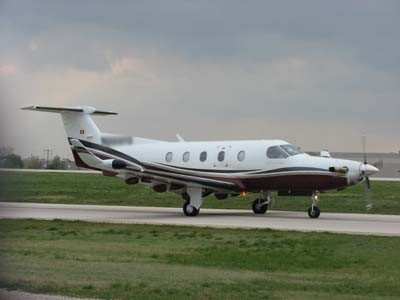
I'm not alone in my appreciation for Addison. Even during the
week, you will find other cars parked nose-out in that office
complex parking lot, to give their planespotting drivers a better
view of the runway. Some are on their lunch breaks, away from their
office jobs. One I spoke to a few months back admitted he had woken
up that morning, and decided to play hooky so he could go watch
planes instead.
While signs are posted in that office parking lot to discourage
"loitering" -- one office has even gone so far as to post a
sign encouraging payment for planespotters (shown below) -- I've
never seen anyone hassled or told to leave, including myself.
Everyone involved seems to have an unsaid, tacit understanding of
the forces at work here. People love to watch airplanes. They are
inspiring.
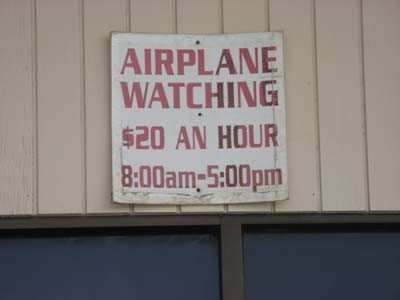
And such was the case on my most recent visit. I'd been away
from Addison for a little bit, after starting up lessons in Grand
Prairie. A service bulletin has kept the SportStar grounded for the
past several weeks (ugh, right after my
solo) awaiting a new fuel pump.
On this particular Sunday, after two weeks on the ground, I
realized I needed my airport fix, and badly. So off to Addison I
went, NavCom in hand and Jimmy Buffett playing on my MP3.
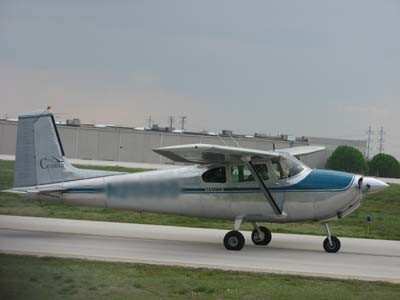
Traffic was comprised of the usual mix of swanky business jets;
older Lears and Falcons, flying for freight dogs; a plethora of
Cirruses and Cessnas; and an eclectic mix of other general aviation
aircraft. Addison is an equal-opportunity airport; as long as you
can afford the fuel and fees, all are welcome to use the airport's
single 7,200' x 100' runway. The tower controllers are also some of
the cheeriest folks I've ever heard.
I parked my car, and joined the others watching as a
beautiful Cessna 310 taxied towards the end of the runway. An even
more pristine late-1950s-vintage Cessna 182A followed close
behind... and behind that, a Pilatus PC12. A FlexJet Lear 45 was
holding short at the front of the line, ready for takeoff...
waiting for a Long-EZ to cross the threshold on landing, so they
could take position.
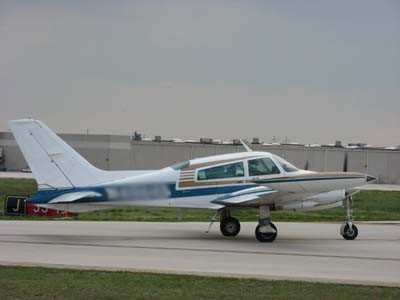
Some of the spotters, like me, take pictures. Others sit in
their cars, or on folding chairs, and simply watch. A few have
their scanners tuned to the Addison tower frequency. A family is
sitting at the far end of the parking lot, in front of their Land
Rover SUV, their kids playing on the grass. Those kids stop what
they're doing when the Lear throttles up to take the runway... and
they continue to watch as it takes off. And then they go back to
their game... until the next plane comes along (which turned out to
be a P40 Warhawk... like I said, this is one cool airport.)
You don't have to be a pilot to appreciate airplanes. Heck, you
don't even have to like flying to like airplanes. My dad hates to
fly... but he loves going to airports. I'd like to think his son
had some influence on him there.

So... what does all this have to do with the FAA, and
Administrator Marion Blakey? Good question.
Until recently, I believed the ongoing user fee battle was
something of a dog-and-pony affair. The FAA has presented what it
wants; the GA and bizav community flatly replied it wants none of
it. In a past life, I sold enough cars to know how this process of
negotiation plays out: after a lot of bombast and grandstanding,
all parties will win something, and all will lose something. In the
end, the planes flying today will in all probability still be
flying tomorrow, too (right?)

Throughout the FAA's suspect logic in pitching its user fee
plan, I never took arguments made by the Administrator, or her
associates, personally.
And even though Ms. Blakey's own words lately
have sounded less like the general aviation advocate she's
presented herself to be through her years of attending Oshkosh and
other GA events... and more like someone who's grooming herself for
an airline job when her tenure with the government expires later
this year... I still liked and admired the Administrator, and even
the FAA. Really.
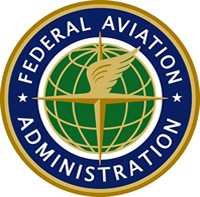 As EAA President Tom
Poberezny pointed out in an
Aero-Cast special feature interview this week, the
user fee battle is but one aspect of the general aviation's
community's relationship with the FAA. Yes, the funding battle
looms large... but we should also keep in mind the good the FAA has
done. And in my book, the good has outweighed the bad.
As EAA President Tom
Poberezny pointed out in an
Aero-Cast special feature interview this week, the
user fee battle is but one aspect of the general aviation's
community's relationship with the FAA. Yes, the funding battle
looms large... but we should also keep in mind the good the FAA has
done. And in my book, the good has outweighed the bad.
While I might be a rare example, all of my dealings with the FAA
-- including a recent visit to the Dallas FSDO to clear up
some paperwork with my sport pilot student certificate, that was
admittedly my fault -- have been painless. I've met some
really great people in the agency's employ, too. And speaking of
sport pilot... if it weren't for the FAA's advocacy and approval of
the sport pilot rule in 2004, I wouldn't be flying right now. I'm
eternally grateful for that opportunity.
From the FAA's first official announcement of its funding plan
last month, I also suspected Blakey was
tasked with pitching a plan that she herself likely had little
actual input on. Like a car salesperson running to their
manager for approval, Ms. Blakey's main job right now is to "sell"
a set of numbers put together by others behind the scenes -- both
within and without the FAA. It worries the hell out of me that some
of those players are domestic airlines... operations that, with
precious few exceptions, have shown little aptitude in running the
kind of "business" the FAA wants to be.
Which brings me back to Addison. Should the FAA's funding
reauthorization plan go through, fewer aircraft will be flying into
ADS, and all other general aviation airports. That also means
fewer people working, and fewer dollars contributed to the
economy. If user fees are implemented, fewer aircraft will be
worked on by mechanics... fewer corporate pilots will be flying
clients to far-off destinations... fewer FBO workers will be needed
to fuel planes, in the aftermath of a steep dropoff in general
aviation traffic.
That is not partisan "rhetoric," as Blakey would love to have us
believe it is. That is fact... and that is history. One merely
needs to look at the effects similar user fees have had on general
aviation traffic in Europe and Canada to see it. When GA pilots are
levied fines on services disproportionate to what are used -- or,
on services those pilots simply DON'T use -- a significant portion
of that country's transportation infrastructure vanishes.
Or, worse... they still fly, but take several risks in flight in
order to avoid being charged that extra landing fee, or
decline to get that updated enroute weather briefing because they
need that money for fuel. (Want proof? Watch
this short video on the AOPA website.)

Encouragingly, it appears many of our representatives in
Congress have gotten the message loud-and-clear from
their pilot constituents, and are passing that argument along as
we've voted them to do. That's not "rhetoric," that's Democracy.
All patriots please rise, and salute.
But Ms. Blakey doesn't see it that way. Instead, at first we
heard the same old arguments against congestion, and for the need
for an advanced ATC system; now, we get accusations of narrow
interests, and "partisan politics."
With all due respect, Administrator... I belong to the same
political party your boss does, as I would daresay
about half of all pilots do. Representatives on both sides of
the aisle have spoken out against the proposed FAA funding plan.
How on Earth are our concerns partisan? I'd like to hear your
answer; I'd like you to HAVE an answer.
I'd also like to know what happened to the FAA
Administrator who told audiences at AirVentures past that she was a
supporter of GA. I don't particularly care for the person who has
taken her place, who spouts the company line and appears to have
little concern for the Other Side Of The Story.

I was at AOPA Expo last year in Palm Springs, and I attended the
Meet the Administrator forum... where Ms. Blakey stood up and said
she was passionately
opposed to the same "broad" user fees she now
espouses. I was also there when one pilot -- obviously
tired of what he considered to be the Same Old
Story -- took direct aim at the fact the Administrator
is, herself, not a pilot.
Like many in the audience, I cringed when I heard that... and I
applauded when AOPA president Phil Boyer responded the FAA
Administrator doesn't have to be a pilot, to appreciate general
aviation. No, she does not. But she does have to like
airplanes, little ones and big ones.
To that end, I'd ask that Ms. Blakey consider taking a Sunday
afternoon off to go watch planes land and take off at a
nearby GA airport, and get some perspective. Consider how many
jobs are behind each of those planes -- from the lowliest Beech to
the ritziest BBJ -- and what would happen to them if that plane
wasn't flying.
More importantly, the FAA Administrator should also take a look
at some of the other faces in the crowd.

Watch the people watching the planes, Ms. Blakey. Look at the
parents pointing out aircraft coming into land to their children.
Look at aviation's future. And consider what the plan you're
pitching so enthusiastically -- like the team player you are --
would do to them. Fewer planes flying mean fewer reasons for those
kids to go to their local airports on any given Sunday, and be
inspired.
If this admittedly emotional argument doesn't sway you, Ms.
Blakey, then consider the long-term impact your plan would
also have on the very airlines that want reauthorization to go
through. Fewer planes flying also means fewer students with the
financial means available to undergo flight training; it also means
fewer schools will be around to teach them. How will the airlines
fly without pilots? Eventually, even airline-oriented flight
schools will suffer the fiscal impact, when
they pass their increased fuel and registration costs
directly on to their students.
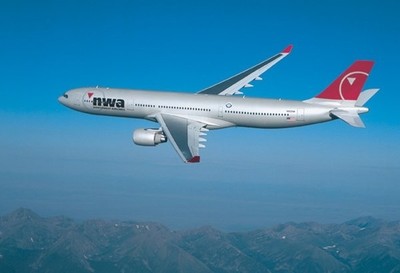
Ms. Blakey, you've been to Oshkosh. You've been to AOPA. You've
spoken with pilots, and said to their faces they wouldn't have to
worry about the kinds of charges you are now a vocal advocate for.
You know better than to pitch the bill of goods you're now
selling.
Or is it too late?
 ANN's Daily Aero-Term (04.14.24): Maximum Authorized Altitude
ANN's Daily Aero-Term (04.14.24): Maximum Authorized Altitude ANN's Daily Aero-Linx (04.14.24)
ANN's Daily Aero-Linx (04.14.24) Classic Aero-TV: 'We're Surviving'-- Kyle Franklin Describes Airshow Life 2013
Classic Aero-TV: 'We're Surviving'-- Kyle Franklin Describes Airshow Life 2013 Aero-News: Quote of the Day (04.14.24)
Aero-News: Quote of the Day (04.14.24) Airborne 04.09.24: SnF24!, Piper-DeltaHawk!, Fisher Update, Junkers
Airborne 04.09.24: SnF24!, Piper-DeltaHawk!, Fisher Update, Junkers















